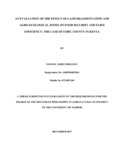Resource information
Declining size of the farm holdings in most high agricultural potential areas as a result of continuous land fragmentation is currently a major policy concern in Kenya. The purpose of this study was to evaluate the effect of land fragmentation and agro-ecological zones (AEZs) on food security and farm efficiency in Kenya. The study used data collected from 384 farm-households that were randomly selected from three AEZs in the Embu County, using a multistage stratified sampling technique. The three agro-ecological zones were the Sunflower, Coffee and the Tea zones, based on the official AEZs classification system in Kenya. The status of household food security was determined using household caloric acquisition method which was used to compute a household food security index (HFSI). Farm efficiency was measured using stochastic frontier method. The Analysis of Variance (ANOVA) and Multinomial Logit Regression Analysis were used to evaluate the effect of land fragmentation on food security and farm efficiency. The effect of land fragmentation on household food security was found to be negative in the Sunflower and Tea zones, but not in the Coffee Zone. Further, it was found that the minimum farm-size that could ensure the attainment of threshold level of household food security (HFSI = 1) was above 2 ha in the Sunflower Zone and 0.5 ha in the Tea Zone. Land fragmentation was found to have a positive effect on farm efficiency in the Coffee and Tea zones, but not in the Sunflower Zone. For assurance of sustainable food security in Embu County, this study based on its findings recommends that further fragmentation of farms below the minimum size for attainment of threshold level of household food security should be discouraged. For the farms that are already below the minimum cut-off size for food security, measures to increase these farms‟ productivities so that they can support more people per ha should be devised and implemented.
Other measures that should be taken to improve food security are increased technology adoption, farmer training, market and road infrastructure and credit.


